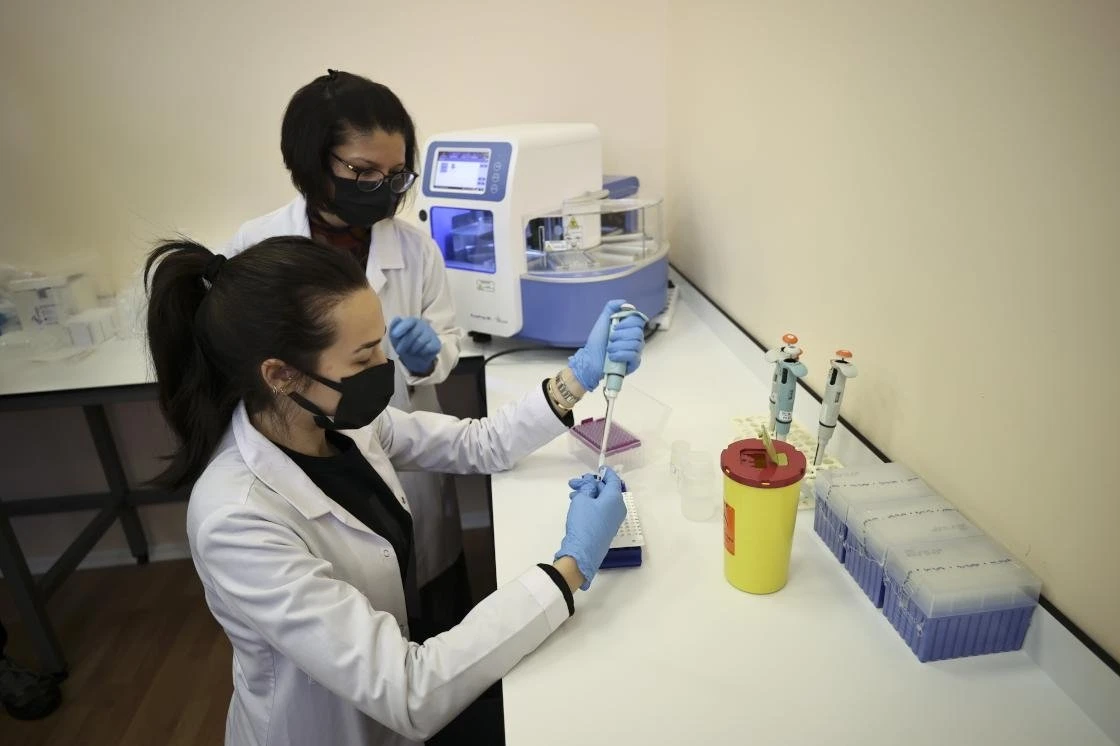Türkiye becomes global hub for genetic testing: 8,000 rare diseases diagnosed
 Staff work at a lab where genetic screening results of couples for SMA is held, in the capital Ankara, Türkiye, Dec. 28, 2021. (AA PHOTO)
Staff work at a lab where genetic screening results of couples for SMA is held, in the capital Ankara, Türkiye, Dec. 28, 2021. (AA PHOTO)
Turkey has become a leader in the genetic diagnosis of rare diseases, with over 100 licensed centers utilizing locally developed kits to test for 8,000 rare diseases. This development marks a significant shift in medical practices that previously required sending blood samples to Europe.
Türkiye’s leap in genetic testing, end of dependency era
- With more than 7 million people affected by rare diseases in Türkiye, genetic testing is crucial for diagnosis, especially considering the higher prevalence due to consanguineous marriages.
- Türkiye now diagnoses all 8,000 known rare diseases using locally developed and produced test kits, eliminating the need to send samples to Europe.
The era of sending blood samples from Türkiye to Europe for genetic testing is almost over
Prof. Dr. Serdar Ceylaner, Vice President of the Rare Diseases Committee at the European Union of Medical Specialists
- In the early 2000s, most rare disease tests in Türkiye were sent abroad. Today, numerous local genetic centers can diagnose all known 8,000 genetic diseases using locally developed diagnostic kits.
- These tests are not only more cost-effective but also of higher quality, attracting international samples to Türkiye.
How is genetic testing infrastructure in Türkiye?
- Türkiye has over 100 licensed genetic disease evaluation centers, including those in state hospitals, universities, and private facilities.
- Genetic tests have become central to modern medical practice, especially in cancer treatment, where personalized medicine relies on understanding genetic mutations in tumors.
How carrier screening is vital for public health?
- Despite advancements, carrier rates for many diseases remain unknown. For instance, the superior mesenteric artery (SMA) affects 1 in 40, with 150-200 SMA-affected babies born annually. Carrier rates for conditions like phenylketonuria and congenital adrenal hyperplasia are also significant.
- Both newborn screenings and pre-marital carrier screenings are highlighted as crucial for public health, with professor Dr. Gulay Ceylaner, head of the Rare Diseases Volunteers Association, stressing that these screenings, though initially costly, will significantly benefit the national economy in the long term.
Why early diagnosis is important
- The importance of early diagnosis is emphasized by the fact that many babies with rare diseases die without receiving a diagnosis.
- Dr. Ceylaner emphasized that genetic testing is crucial for early diagnosis and treatment, reducing the time to diagnose a rare disease to an average of 5.7 years.
- Around 80% of rare diseases have genetic origins, making genetic tests vital for their identification.
Even if a child is ill, early diagnosis through a drop of blood from the heel can lead to normal development. No one has the right to take this away from children.
Dr. Gulay Ceylaner
Ministry of Health’s role in newborn screening
- The Ministry of Health has integrated genetic testing into newborn screening programs. These include tests for phenylketonuria (PKU), biotinidase deficiency, congenital adrenal hyperplasia, and cystic fibrosis, starting from blood taken from the newborn’s heel.
- Currently, six diseases are screened, including PKU and cystic fibrosis. Since December 2021, screenings for SMA carriers have been added for newly married couples, alongside Mediterranean anemia.
What happened: The recent public debate in Kars, Turkey, ignited when a family refused to allow their newborn’s heel blood to be drawn for newborn screening. This seemingly minor act has escalated into a legal case that has sparked significant discussion about the balance between parental rights and public health.



